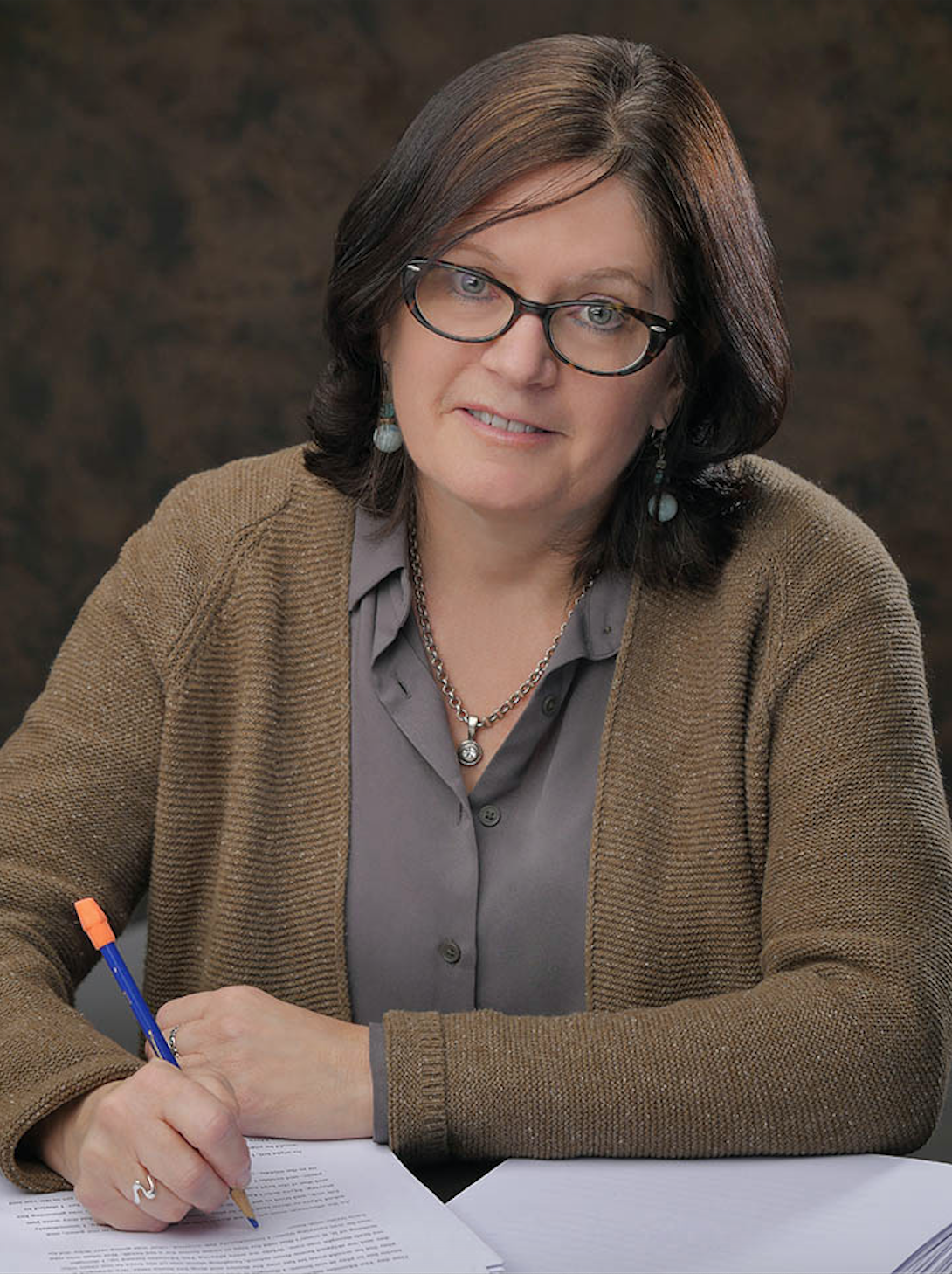
This article about Carrie Cantor, who has three decades’ worth of experience in the book publishing industry, is about the importance of searching for the right editor, the value an editor can bring, and her own process when working with an author. The full article was originally posted at Write Magazine.
Authors have the responsibility of churning out words day by day, just to put into written words the story that has already played out in their heads. Once they have fleshed out their idea up until the last page, then they are ready to go to the next step – that is, searching for an editor!
For most authors, what it means to find an editor is to find someone who can edit the grammar and syntax of your sentences. However, an editor is capable of doing more than these. Their role includes checking the story’s descriptions, pacing, logic, coherence, and general flow. If you are in the process of polishing your manuscript to make it more appealing to potential publishers, then getting some insights on what editors are should help you. Editor Carrie Cantor, a veteran book editor who has three decades’ worth of experience in the book publishing industry, will provide us with insights on the value that an editor brings you. Let us take a sneak peek into what happens when an editor gets their hands on your book.
Is an editor different from a literary agent? What does an editor do?
They are two completely different jobs. A literary agent represents a manuscript for the purpose of trying to sell it to a publisher. The agent helps determine the “hook” and usually helps craft a proposal that will make the book attractive to publishers. If the book is picked up by a publisher, the agent receives a percentage of the author’s advance and of later royalties when the book starts to make money. In contrast, an editor gets paid directly by the author for services rendered in helping write the book (or the proposal for the book).
In my capacity as editor, I work for writers, most often critiquing their manuscripts on content and organization. I help them with narrative arc, organization, structure, and all kinds of general writing issues. Every writer, and every manuscript, has different strengths and weaknesses. After the writer has taken my critique and created a new draft, if he or she wants to go to the next level of editing, I work on the manuscript line by line to help polish up the writing.
When working with the literary agency (I’m affiliated with Joelle Delbourgo Associates), I often help craft proposals and query letters that are used as selling documents to publishers. The goal is to effectively present the “hook” and the most relevant information about the book so that acquiring editors will see why they should consider publishing it.
Can you share a bit about your background and what led you to become an independent editor?
I majored in literature and then went to graduate school at the Johns Hopkins School of Advanced International Studies. I studied in Europe, learned to speak French and Italian, and have always loved language and writing. At the start of my career, I worked as a journalist covering international economic issues but soon decided I didn’t care about getting “scoops” as much as I liked going in-depth on various topics. I made the transition to books by starting as a copy editor and working my way up to production editor and then acquisitions editor. I felt like I was born to work on books and have been in the business now for thirty years.
Bring us into your process. How do you start work on a manuscript? What does your workflow look like?
It depends on the job and what the author has asked me to do, but I’ll talk about the most typical situation. Usually, I start by reading the entire manuscript to provide an overview of what’s working about it and what needs improvement. I call this process a “critique” or a “manuscript assessment” or sometimes a “macro-edit.” I’ve also heard this called a “content edit.” In this part of the editing process, I focus on the forest, not so much on the trees. Often, there are problems with narrative structure (if it’s a novel) or organization (if it’s nonfiction), and it’s essential to get at those issues before anything else. After this stage, the author will write a new draft based on my feedback. So, usually a couple of months later, I will look at this new draft and either do a new critique or move on to a line-by-line edit, depending on what’s needed. Sometimes, there is a third stage in which the line-edit is further refined.
If I’m working on a book proposal, that’s a very different process. In that case, I’m looking at a book as a “product” and am helping the author describe this product to the immediate potential “buyers”—i.e., agents and/or publishers. I help the author figure out how to describe the book succinctly and focus on the aspect of the book that will have commercial appeal. This process involves a lot of back and forth with the author, and there might be several drafts of the proposal before we get it right.
One thing about my job is that every client, every book, every situation is a little different, so there is no one-size-fits-all method of working. That’s why it’s always interesting!
What is your take on giving “constructive criticism” to authors?
It’s essential to choose words carefully. The messenger is just as important as the message. If an editor comes across as harsh and critical, the author’s defenses will be triggered and she won’t really take in what the editor has to say, even if the advice is good. We all react this way to criticism, it’s a natural human response. So I make sure to emphasize whatever about the manuscript is good. It’s important for the author to realize he or she has done many things well. And I try to make my comments impersonal in the way I phrase things. For example, I won’t say, “You tend to repeat certain words.” I’d more likely say, “There are a few words that are a bit overused. More variation in the vocabulary might enhance the narrative.” I might be more verbose in saying what I need to say, but, when dealing with people’s feelings, I think that’s a small price to pay.
If delivered in the right manner, constructive criticism is like sweet medicine to writers. They are so glad to drink it in and are usually energized by the ideas that come to them once they start thinking about how to implement the suggestions.
Were there any authors who were unable to accept negative feedback? If so, how did you deal with them?
This has rarely been a problem. When clients hire me, it’s because they know they need help. They are expecting a certain amount of “negative feedback”—though of course we don’t like to think of it that way. We think of it as constructive feedback leading to improvement. Negative feedback sounds like something that is not respectful or helpful. Many of my clients tell me right at the start to “tear my work to shreds” and “don’t hold anything back!” When I hear that, I laugh because of course I’m not going to tear them down in any way. But I do love that attitude on the part of an author who wants to hear about every little thing, because I know that this type of personality is most capable of doing great work.
That said, I did have one CEO author who wrote a memoir/business-advice book, who seemed to be “triggered” by my suggestions on how to improve the book. He took my gently delivered constructive criticism as an insult to him. I reminded him that he had paid me to critique the book, but he just couldn’t process that idea. Being a CEO, he was not used to people questioning him in any way. Some people aren’t able to handle honest feedback, I guess, but I imagine most of those people don’t seek out an editor in the first place.
What’s the best thing about your job? How about the worst?
By far, the best thing is hearing from authors that they learned a lot from our process and that when they’re writing they now often hear my voice in their head, helping them be better. This is very rewarding. I’m not the kind of person who could teach in a classroom—I don’t have the temperament for it—but I like that I’m able to teach people one on one in this way.
Another best thing about my job is having the chance to work with people on something really important to them, something that often reflects their best self. In some cases, if it’s a memoir (and I do a lot of those), I might be getting a really intimate view of their life. People are so fascinating, and sometimes the glimpses that I get into their lives are tremendously moving.
The worst thing is the frustration of seeing how much the traditional publishing industry excludes so many good writers because they don’t have a big platform. A lot of good books are rejected because publishers don’t want to take chances anymore. But I’m glad to see that many of my clients self-publish and get their books out to the public by their own efforts.
What are the common resources or tools that you use in your job?
My main tool is the big round blob that sits on my shoulders! LOL. It contains my experience, taste, judgment, [and] knowledge of the industry. Because I was an acquisitions editor at a mid-sized Manhattan publishing company for several years, I got to know how the process works from that important perspective. I’m currently part of a literary agency, so I hear what today’s acquisitions editors are asking for, what they’re concerned about. I see the trends in the industry. This experience is what I draw on in guiding my clients through this murky business.
My other tool is my ability to communicate in a constructive manner with authors. As I said above, authors need to trust you and feel good about you or they won’t take your advice, so the communication part is very important.
Grammarly is a tool used by both editors and authors. Do you have any opinions about it?
I don’t have an opinion. I have not used it. My focus is more typically on content, organization, good writing, though of course I correct grammar as well. Whenever I have questions about grammar, I generally consult CMS or Wikipedia.
Can you share a funny or amazing anecdote when you are working as an editor?
One memorable incident occurred when I was an acquisitions editor. I was working on a book about a popular television show. The manuscript had some great material in it, but you had to read through a lot of mediocre stuff to find the gems, and the book was way too long. I had to convince the author to cut the manuscript back by about half in order to keep the page count down to something reasonable and to make the book more solid. (The publishing company was totally behind me on this.) He was devastated because he had worked so hard to find all of the various tidbits and was in love with all of it. It soured our relationship for a bit. But when the book came out, he read through it and was enthralled by it and admitted that it was a much stronger book because every page was exciting, no filler. He sent me flowers! It was a lovely outcome.
If you want an X-rated story…well, at the same publishing company, we did all kinds of niche nonfiction books, including how-to, self-help, and…erotica. We took on a book about “female dominance,” written by a very confident-seeming woman with a big personality who was in the “sexual fantasy” business. She wrote a pretty good “how-to” book for women about how to role-play as a “dom.” The book did pretty well, and we signed her up for a second book on the opposite: how to play a “submissive.” It included rules, games, scenarios, etc. The books were playful, sexy, cheeky, and truly meant to serve a “certain community,” LOL. Well, in the introduction to the second book, the one about submission, she wrote a whole lot about her childhood, mostly about how her father had abused her—leading to her become a sexual “submissive” later in life, as she looked for daddy figures to replicate the way her father had treated her. It was super serious stuff, heartbreaking, insightful, very moving, but absolutely not appropriate for the book. With the publisher’s blessing, I had to have a heart-to-heart talk with her. I told her how moved I was by what she wrote, and how I would like to see her write a memoir that included those memories and insights, but I had to ask her to take it out of the book we were doing, which was meant to be light-hearted and fun. She was fine with it. But I’ll never forget that experience of reading her introduction, seeing this feisty woman in a whole new light, and then having that conversation. It moved me greatly.
What’s your opinion on self-publishing? What do you think of those authors who prefer to self-publish their books?
I haven’t met any who actually prefer self-publishing—most would love to get a contract from a traditional publisher—but I have a few clients who have embraced self-publishing and are making it work for them. I admire them so much. One, in particular, a woman who has used me to edit eight of her self-published novels, really knows the landscape and spends a lot of time marketing her books pretty effectively. I’ve actually learned a lot by watching how she does that.
I’m so glad writers have this option. A lot of well-written books that would have easily landed a publisher 30 years ago don’t stand a chance in today’s commercial environment, so it’s great that these books can be brought out to the public. I would just caution writers to look out for the scammers. Stick with reputable service-providers.
Is the current publishing trend significantly different from the past? How so?
Yes, it’s quite different. In the past, all of the publishing houses were owned by people who went into the business because they loved literature. These people could have chosen to invest in more reliable, more profitable businesses but chose instead the very unreliable business of publishing books, in which every year you have to sell dozens or hundreds of products, each completely unique from all of the others. It’s a maddening business model. Some years, a publishing company had a best-seller or two and did really well. Other years, they didn’t do so well. But they were okay with that. It was a labor of love. Today, all of the main publishers are part of big media conglomerates, and the business is all about annual growth and making money for shareholders, not so much about publishing great literature (though some of that still happens too). Publishers no longer take risks. There is not as much opportunity for newcomers or for midlist books. It’s quite a different landscape, and it has affected every aspect of the business.
What is your advice to authors who want to get their book traditionally published?
You need an agent. To get one, you need a solid “platform” and a timely, well-written book. You need to have the book professionally edited, not just for grammar and overall writing but also to help you position the book to have commercial appeal. Of course, whether that will work depends on the book. Especially with nonfiction books, it’s possible to reconfigure the content of the book to speak to a need that can be served, and that’s what can give it commercial appeal. I do this in my capacity at the agency. JDA does mostly nonfiction. Sometimes we get nonfiction proposals from serious authors with good content that has real potential but that isn’t presented in a way that lays out a problem and shows a solution to the problem. My role is often to work with the author to reframe content in a way that makes it saleable in the current environment.
I think that a lot of writers don’t quite realize that being a published author isn’t just about writing a really good book. It’s also about writing a saleable book. Sometimes, it’s a rude awakening when they realize that not all well-written books are saleable.
I would also advise writers to become familiar with basic book marketing and the importance of a platform. It will help, when dealing with agents and publishers, to show some savvy on those subjects.
Carrie Cantor is an editor who specializes in projects about current events, politics, history, popular science and psychology, memoir, and narrative nonfiction. Connect with her on LinkedIn.
Do you need an editor? Pitch your book to us below, and we’ll work to match you with an editor like Carrie who can help you bring your vision to life.



